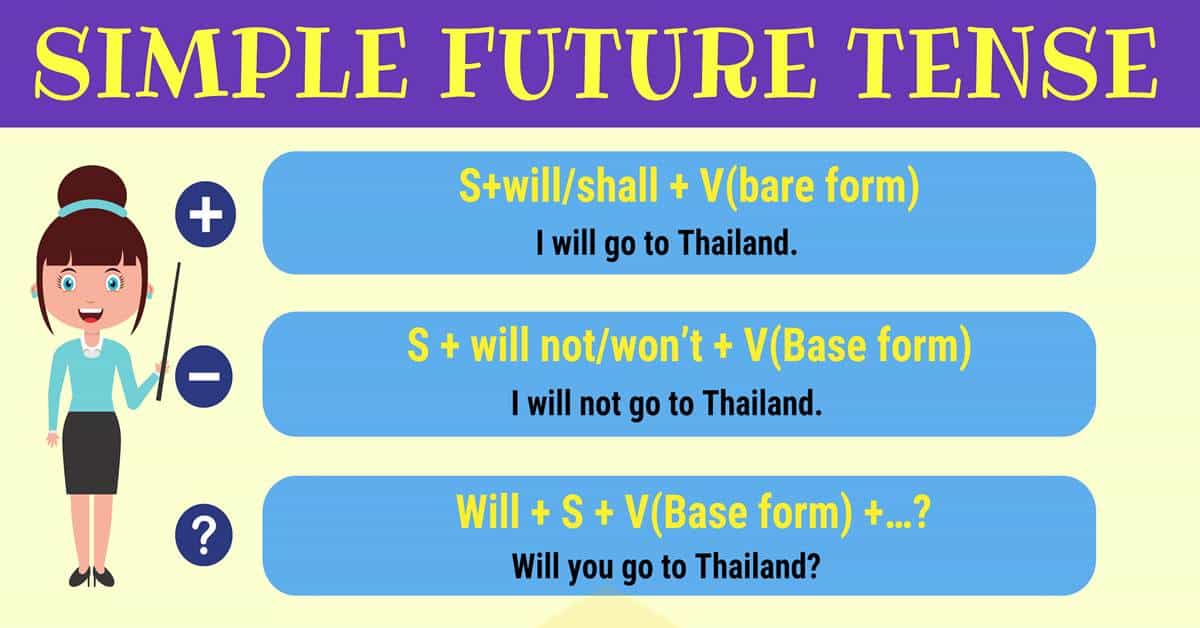Introduction
Tense is a term in English grammar and refers to a form of the verb that indicates time. Time is a universal, non-linguistic concept with three divisions - Past, Present and Future; by tense, we understand the correspondence between the form of the verb and our concept of time. When making a statement it is essential to indicate whether a situation exists now, existed in the past or is likely to exist in the future.
The Simple Future is used to express facts that are going to happen in the future. It is sometimes called the future simple tense. It is used to talk about things that are certain to happen. To form the Simple Future, you use will/shall + the base form of the verb (not its -ing form). We use shall when we are saying that the speaker is personally involved in the action. If we are not personally involved in the action, we use will.
Simple Future Tense - Rules and Examples | English Grammar
✅ Rule 1
It is used to talk about things which we cannot control. It expresses the future as fact. We use this tense to talk about what we think or believe will happen in the future; as,
- I think India will win the match.
✅ Rule 2
It is used to express habitual action which will take place and which we cannot control; as,
- Spring will come again.
✅ Rule 3
It is used with clauses of condition, time and purpose; as,
- If I do this exercise, it will help you.
✅ Rule 4
With adverbials such as tomorrow, day after tomorrow, next week, next month, on coming Saturday, in 2010 etc.; as,
- She will do this practice next month.
✅ Rule 5
It is used to express the speaker’s opinion or assumption about the future, the tense is used with: think, know, hope, suppose, believe, expect, perhaps, probably, surely; as,
- I think he will play.
✅ Rule 6
Verbs not generally used in the continuous tenses, e.g.auxiliary verbs, verbs of the senses, of emotion, thinking, possessing etc usually express the future by the future simple, though be going to is sometimes possible; as,
- He will be here at six.
- You will have time for tea.
✅ Rule 7
It is used, chiefly in newspapers, and news broadcasts, for formal announcements of future plans and for weather forecasts; as,
- The president will open the new heliport tomorrow.
- The fog will persist in all areas.
✅ Affirmative Sentences
Pattern:
➤ Subject + will/shall + verb (Ist form) + object.
- I shall meet Dr Verma tomorrow.
- He will do his work honestly.
- She will always obey her parents.
- Zeenat and Jannat will win the competition.
✅ Interrogative Sentences
Pattern:
➤ Will/Shall + subject + verb (Ist form) + object?
➤ Q.W. + will/shall + subject + verb (Ist form) + object?
- Will you accept my advice?
- Will he attend the meeting on Sunday?
- Why will they do the work here?
- Who will come to meet you tomorrow?
✅ Interrogative Negative Sentences
Pattern:
➤ Will/Shall + subject + not + verb (Ist form) + object?
➤ Q.W. + will/shall + subject + not + verb (Ist form) + object?
- Will you not take the examination this year?
- Why will they not celebrate Holi this year?
You May Also Like 👇
Loading...

